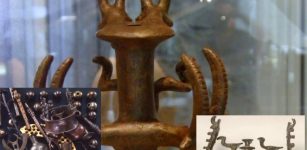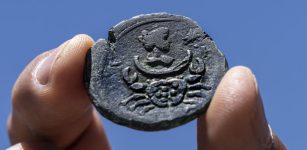Bulla Felix: Legendary Italian Leader Of Outlaws Who Robbed The Rich And Gave To The Poor
A. Sutherland - AncientPages.com - Bulla Felix was a legendary Italian 'bandit' who reminds us of Robin Hood, a heroic outlaw from Nottingham, England, who robbed the rich and helped the poor in England.
Bulla Felix (in Latin: "Lucky Charm") was a master of disguise. He was always one step ahead of the law, but his goal was not to kill but to steal riches from wealthy people. Most details of Felix's life come from the writings of Cassius Dio, a Roman statesman and historian of Greek origin who published 80 historical works on ancient Rome.
Dio reported that a group of brigands led by Bulla Felix began to seriously trouble the Roman authorities during the reign of a despotic ruler, Emperor Septimius Severus. While he ruled from 193 to 211 AD, he founded a personal dynasty and transformed the government into a military monarchy.
Bulla's group comprised about 600 men - mostly escaped enslaved people but even former Praetorians from Rome's most prestigious military units. They raided Italy for almost two years in the early 3rd century CE (205-207 CE).
Dio's forces were sent to capture Bulla, an elusive and clever enemy. He managed several times to escape the authorities, who tried to lure him into a trap. The Roman troops searched for him for two years.
"Although many men pursued Bulla, and Emperor Severus himself tracked the man zealously, he was never seen when seen, never found when found, never caught when caught. In part, this was because of Bulla's great generosity with gifts and intelligence," wrote Dio.
Roman alabaster and marble bust of Septimius Severus, Musei Capitolini, Rome. Image credit: antmoose - CC BY 2.0
When we read these words written by Cassius Dio, we see that the Roman historian wrote about the brave man, Bulla, in relatively favorable terms. Perhaps he admired Bulla's intelligence, which efficiently helped him outwit his opponents.
Once, Bulla cleverly tricked a centurion, a professional Roman army officer, who followed him. He gave him a message to the Emperor:
"Tell your masters that they should feed their slaves enough so that they do not turn to a life of banditry."
Not much is known about Bulla Felix's life before he became a rebel. It is known that a priest raised him, and the young Felix learned how to read and write. Growing up, he was interested in theology, law, and philosophy.
Later, his life changed. He organized his people and operated in mountainous areas of the port of Brindisi (Brundisium) in southern Italy, on his way north from Brindisi to Rome.
He was a well-educated leader of his small army of 600 men, organized in a sophisticated intelligence network based on information from many contacts loyal to him.
Interestingly, a rebel Bulla was not defeated by the Roman soldiers or the strategic superiority of the Roman Emperor. Instead, his tragedy was his betrayal of a woman he was intimately involved with. Some sources say that the woman betrayed him for a fee. Another version of the story is that her name was Julia Domna, and she was Emperor Septimius Severus' spouse who did it when her husband was away in Britain.
In 207 CE, an order came from the Emperor himself to capture the living Bulla and punish him. The Emperor did not accept defeat and wanted Bulla alive. In the end, wild beasts condemned Bulla Felix to death in the arena.
Cassius Dion's story about Bulla Felix expresses the opposition of a Roman historian and senator to the Emperor.
We will probably never know if Bulla Felix was Cassius Dion's imaginative figure or a real robber. However, in the story of a Roman 'bandit' and a brigand who was against unjust power, we find many references to other historical tales about great and brave men in different cultures.
Written by – A. Sutherland AncientPages.com Staff Writer
Updated on April 16, 2024
Copyright © AncientPages.com All rights reserved. This material may not be published, broadcast, rewritten or redistributed in whole or part without the express written permission of AncientPages.com
Expand for referencesReferences:
Osborne R. Studies in Ancient Greek and Roman Society
Grunewald T. Bandits in the Roman Empire
More From Ancient Pages
-
 Study Of Ancient Skulls Sheds Light On Human Interbreeding With Neandertals
Archaeology | Aug 23, 2022
Study Of Ancient Skulls Sheds Light On Human Interbreeding With Neandertals
Archaeology | Aug 23, 2022 -
 Three Roman Shipwrecks Discovered Off Tunisian Coast – One Is 2,000-Year-Old
Archaeology | Jun 9, 2023
Three Roman Shipwrecks Discovered Off Tunisian Coast – One Is 2,000-Year-Old
Archaeology | Jun 9, 2023 -
 Stunning Images Of Shackleton’s Lost Ship Endurance Discovered Off The Coast Of Antarctica
Archaeology | Mar 9, 2022
Stunning Images Of Shackleton’s Lost Ship Endurance Discovered Off The Coast Of Antarctica
Archaeology | Mar 9, 2022 -
 Mysterious 11,000 – Year-Old Tower Of Jericho: Was World’s First Skycraper A Symbol Of Power Or An Ancient Time-Keeping Device?
Civilizations | Aug 11, 2021
Mysterious 11,000 – Year-Old Tower Of Jericho: Was World’s First Skycraper A Symbol Of Power Or An Ancient Time-Keeping Device?
Civilizations | Aug 11, 2021 -
 Nahal Mishmar Secrets: Priceless Artifacts In Cliff Cave Overlooking The Dead Sea
Artifacts | May 20, 2014
Nahal Mishmar Secrets: Priceless Artifacts In Cliff Cave Overlooking The Dead Sea
Artifacts | May 20, 2014 -
 Earth’s First Animals Had Particular Taste In Real Estate
Evolution | May 10, 2023
Earth’s First Animals Had Particular Taste In Real Estate
Evolution | May 10, 2023 -
 Mysterious Scorpion Goddesses In Myths And Legends
Egyptian Mythology | Jan 26, 2016
Mysterious Scorpion Goddesses In Myths And Legends
Egyptian Mythology | Jan 26, 2016 -
 Magnificent ‘Sword Pyramid’ Lost By A Sutton Hoo-Era Lord Discovered In Norfolk
Archaeology | Aug 21, 2021
Magnificent ‘Sword Pyramid’ Lost By A Sutton Hoo-Era Lord Discovered In Norfolk
Archaeology | Aug 21, 2021 -
 Surprising Discovery Of Unique 3,500- Year-Old Arrowheads Made Of Shells In The Jotunheimen Mountains
Archaeology | Feb 20, 2023
Surprising Discovery Of Unique 3,500- Year-Old Arrowheads Made Of Shells In The Jotunheimen Mountains
Archaeology | Feb 20, 2023 -
 On This Day In History: Great Siege of Malta: Ottoman Forces Made Attempt To Conquer Malta And Failed – On May 18, 1565
News | May 18, 2016
On This Day In History: Great Siege of Malta: Ottoman Forces Made Attempt To Conquer Malta And Failed – On May 18, 1565
News | May 18, 2016 -
 Mummy Of Pharaoh Amenhotep I Digitally Unwrapped For The First Time In 3,000 Years
Archaeology | Dec 30, 2021
Mummy Of Pharaoh Amenhotep I Digitally Unwrapped For The First Time In 3,000 Years
Archaeology | Dec 30, 2021 -
 Blood Discovered On The Shroud Of Turin – Strand Of Jesus’ DNA Can Be Found – Researchers Say
Archaeology | Jul 19, 2017
Blood Discovered On The Shroud Of Turin – Strand Of Jesus’ DNA Can Be Found – Researchers Say
Archaeology | Jul 19, 2017 -
 On This Day In History: First Battle Of Gaza Was Fought – On March 26, 1917
News | Mar 26, 2017
On This Day In History: First Battle Of Gaza Was Fought – On March 26, 1917
News | Mar 26, 2017 -
 First People To Enter The Americas Brought Their Dogs With Them
Archaeology | Jan 29, 2021
First People To Enter The Americas Brought Their Dogs With Them
Archaeology | Jan 29, 2021 -
 16 Meters Long Ancient Papyrus With Spells From The Book Of The Dead Found In Saqqara
Archaeology | Jan 19, 2023
16 Meters Long Ancient Papyrus With Spells From The Book Of The Dead Found In Saqqara
Archaeology | Jan 19, 2023 -
 Maize-Based Diet Of Ancient Maya, Vulnerability To Drought And Collapse Of Society
Archaeology | Jul 8, 2019
Maize-Based Diet Of Ancient Maya, Vulnerability To Drought And Collapse Of Society
Archaeology | Jul 8, 2019 -
 3D Scans Used To Study Mysterious Roman Burial Practice
Archaeology | Jun 5, 2023
3D Scans Used To Study Mysterious Roman Burial Practice
Archaeology | Jun 5, 2023 -
 Millennia-Old Sumerian Tripod Vase Dedicated To God Ningirsu, The Son OF Enlil
Archaeology | Oct 6, 2016
Millennia-Old Sumerian Tripod Vase Dedicated To God Ningirsu, The Son OF Enlil
Archaeology | Oct 6, 2016 -
 Rare 1,850-Year-Old Bronze Zodiac Coin Discovered During Underwater Survey Off Israel’s Coast
Archaeology | Jul 27, 2022
Rare 1,850-Year-Old Bronze Zodiac Coin Discovered During Underwater Survey Off Israel’s Coast
Archaeology | Jul 27, 2022 -
 Scathach – The Shadowy One – Legendary Martial Arts Teacher Who Trained Cuchulainn And Other Warriors
Featured Stories | Mar 4, 2019
Scathach – The Shadowy One – Legendary Martial Arts Teacher Who Trained Cuchulainn And Other Warriors
Featured Stories | Mar 4, 2019


